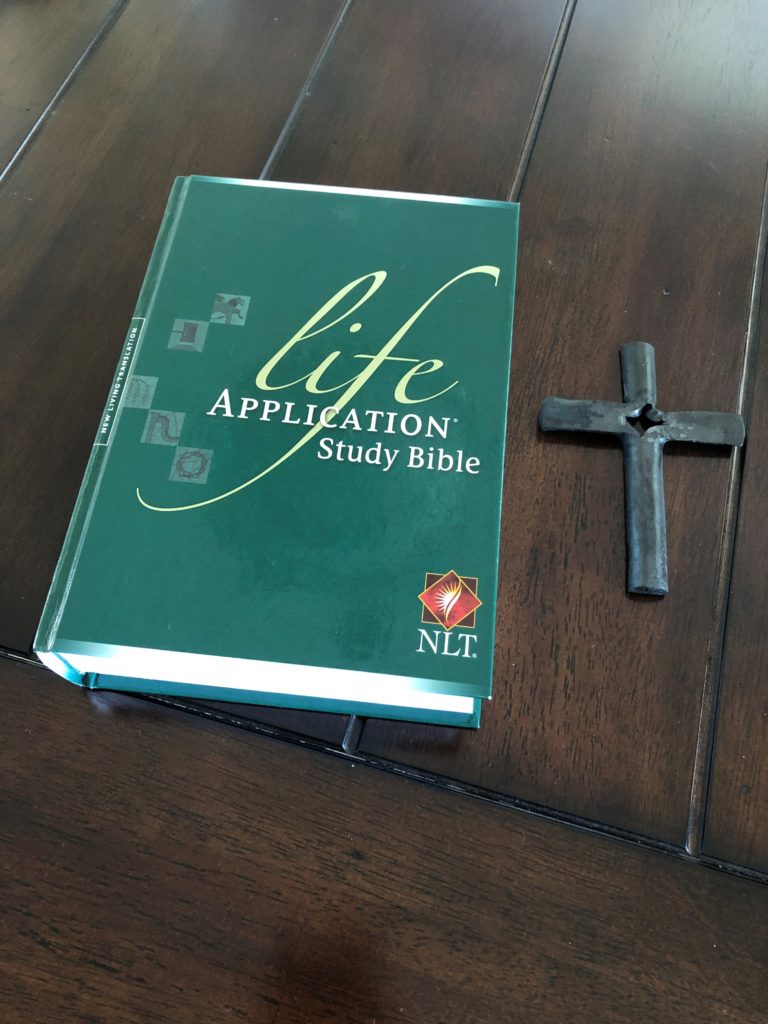
 We all have our own unique Christmas traditions. Maybe you open gifts on Christmas Eve or wait until Three Kings Day in January. Maybe you create a special family recipe or play a game each year. Do you decorate a tree or buy gifts for someone in need? One of my favorite traditions is helping my kids make their Christmas lists.
We all have our own unique Christmas traditions. Maybe you open gifts on Christmas Eve or wait until Three Kings Day in January. Maybe you create a special family recipe or play a game each year. Do you decorate a tree or buy gifts for someone in need? One of my favorite traditions is helping my kids make their Christmas lists.
This year I asked my fellow team members to make their own Christmas lists and include which Bible they wish would be waiting under their Christmas tree. One of the things I love most about working on the Tyndale Bible team is that we are all so different. Each of us brings our individual gifts and abilities so that together we can bring God glory. But though we are all different, yet we are united in the Word that became human. What a reason to celebrate!
Here is what the Bible Team hopes is under their Christmas trees this year. You can click on the Bible title if you want to learn more.

Callie is excited for the new NLT Daily Reader’s Bible.
“I am asking for the Daily Reader’s Bible. I am really curious about the unique layout, and I love the fact that the readings are numbered, not dated. My plan is to start in January, but because the readings are numbered, I don’t have to fear getting behind. I can just pick right back up when I can!”
Blaine is hoping to unwrap a beautiful new classic Bible.

“For Christmas this year, I have selected the NLT Filament-enabled Personal Size Giant Print Black Genuine Leather Indexed edition. Its uninterrupted readable text will allow me to focus on the Scripture without the distraction of study notes or other features. Knowing that a full suite of carefully curated study notes, devotionals, videos, and even worship songs is available to me by simply opening the Filament Bible app and pointing my phone at any page makes this a Bible unlike any other I’ve had the privilege of using over the years. I’m really looking forward to 2021 with this new Bible.”
Kim loves Bibles and surprises so she is sharing her top three so she will be surprised at what shows up under her tree.

“The new Art of Life Bible because this Bible is so gorgeous and artsy—and there’s nothing else like it out there that I know of! I absolutely love that this Bible is slightly oversized with wider margins, comes in a slipcase, and has the most beautiful teal hardcover cloth design with gold foil accents. It looks more like a coffee table book than a Bible, but that’s what I love about it! The inside has amazing hand-drawn illustrations of Bible things like people, animals, and plants scattered throughout along with descriptions. It will be a really fascinating way to read through the Bible and reflect on this artist’s rendition of things mentioned in the Bible. It’s a spacious setting, so I could embellish, color, paint, or add to the illustrations if I wanted to do some Bible journaling in it, but I think I might reserve this one for reading since it’s already so amazing.

The new THRIVE Creative Journaling Devotional Bible for Women just released in two new bindings, and I absolutely love the teal cover with “Thrive” displayed in rose gold foil across the front. Probably my favorite thing about this design is the rose gold page edges. It is stunning, and it pairs so beautifully with the teal. I will be able to spend the whole year reading through the daily devotionals and journaling my reflections and prayers in the wide margins.

The new Inspire PRAYER Bible is another Bible I cannot wait to read and Bible journal in! I would love to use the extra-wide margins in this Bible to write out personal prayers focused on my marriage and also listing out ways (bullet journaling style!) that I can challenge myself to become more like Christ. I would love either of the cover designs—so surprise me! I adore the metallic champagne gold Hardcover LeatherLike binding because it is so special and unique (like me!), but I also love the colorful one because it is so cheerful—and floppy! This Bible has thirty-two of the most beautiful, colorful vellum sheets with prayers on them, prayer prompts in the margins, and hundreds of line-art illustrations I could watercolor, paint, or color in!”
Jim J. is wishing for the genuine leather brown NLT Filament-enabled Edition Personal Size Giant Print Bible. He even wrote this poem:

Under the tree this Christmas morning
I’ll search for the gift I find myself yearning
The Word became flesh we remember this day
Come to teach and to save us, his life to pay
And the Word we are given to keep and to cherish
Comes in beautiful books without being garish
I look for a Bible that is handy in size
With the magic of light, the Filament prize.
With print that is giant, truth without explanation
Expressed in the language of a living translation

For me I want brown with the rich touch of leather
That gift would bring joy as our family’s together.
As I think of that day of holy observance,
I wish for a Bible to illumine remembrance.
Linda is wishing for a stalwart favorite: The One Year Chronological Bible in the NLT.

“It’s not flashy or new, but I would like The One Year Chronological Bible, NLT, Large Print. This year, more than ever, I’d like to start 2021 on a fresh foot, with renewed commitment to good habits that are healthy for my body, mind, and soul. I like the idea of reading the Bible chronologically as it happened, and I think the reading schedule and the way The One Year Bible breaks the Bible into manageable portions for each day is helpful and sets me up to successfully complete reading the whole Bible in a year. The large print edition is also easy on the eyes and would be nice to have.”
Dave is excited to partner with Joni and Friends to intercede on behalf of the most vulnerable by using The One Year Pray for Life Bible.

“The Bible on my wish list this Christmas and the one I plan to use daily in 2021 is The One Year Pray for Life Bible. With sanctity of life issues continuing to dominate the news cycle every day, I look forward to listening to God in his Word daily. I also look forward to joining my voice with thousands of other Christians around the world to pray not only for those who are threatened and impacted adversely by laws and policies but also for those who hold the power to write and support laws that defend the weak and powerless among us.”
Evie is all about relationships, so her wish list Bible is about time with family.

“I am hoping the purple and pink swirl Hands-On Bible is waiting under our Christmas tree. The interactive activities and lessons help me to engage with my girls in God’s Word in a way that keeps them entertained and excited to learn more. I love that we can play together while learning about God and his plan for our lives. It’s so wonderful to come together as a family to have fun and grow in our understanding of God’s Word.”
Jim G. has had a life-long love for the Life Application Study Bible. Here is the one he’d like under his tree.

“The Life Application Study Bible has been such a blessing in my life. Not only did I have the privilege of providing this life-changing Bible to thousands of people when I served in retail stores, but I also recently had the honor of working on the team that published the new ‘Third Edition.’ I just love how I can go anywhere in the Bible, begin reading, and understand how God’s Word really relates to me today. I learn something new every time I pick it up! The notes and features were updated through an amazing collaborative effort between the founding editors and a group of editors across generations which resulted in trustworthy biblical teaching that is incredibly relevant today—regardless of who you are. Also, my eyes appreciate a larger print font size, so the new Large Print Life Application Study Bible, Third Edition, in the handsome brown genuine leather is the forever Bible that I hope to have under my tree this Christmas.”

We are so thankful that the most precious gift given to the world wasn’t wrapped in beautiful gift wrap and placed under a tree. It was a baby placed in a lowly manger who was himself the Word become human.
“So the Word became human and made his home among us. He was full of unfailing love and faithfulness. And we have seen his glory, the glory of the Father’s one and only Son.” John 1:14, NLT










































Recent Comments